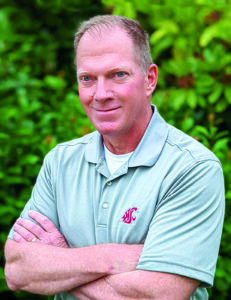By Rich Koenig
The year 2021 has been a year of significant transition, and nowhere is that truer than at Washington State University (WSU) and in the College of Agricultural, Human and Natural Resource Sciences (CAHNRS).
I have seen firsthand many of these transitions and, in fact, became part of a major college-level transition when I took over as interim dean in June. But transitional periods can also be periods of opportunity, and to that end, I am pleased to lead this college through this exciting time. We are set up for success from our former dean, Andre Wright, and we know we will attract excellent candidates from around the nation in the search for the next dean of CAHNRS.
My interim role is a one-year appointment, and I am not seeking the position on a permanent basis. I have agreed to serve on the hiring committee for the next permanent dean and look forward to working with my fellow committee members to help select a candidate to lead our college as we continue to thrive by fulfilling our land-grant mission.
One major transition outside of leadership is planning for and moving our faculty and staff and U.S. Department of Agriculture (USDA) colleagues out of Johnson Hall. The moving should start in January, with the actual demolition to start in May 2022. Removing this venerable and historic building, a place where my own research history dates back to my days as a WSU graduate student, will make way for a new USDA research building. This project is just the latest example of our fantastic partnership with the federal government and the research collaborations built up over decades. The construction of this building will only further galvanize what has already been a successful and fruitful partnership.
Of course, these partnerships are only as good as the faculty and researchers that support them. And now that we have more of a positive budget outlook, we are again hiring and recruiting top talent, and several searches for key faculty positions are, or will soon, be underway across our college, including key Extension positions at the county level.
While new and open faculty positions are being filled, research continues to improve people’s lives. Dozens of projects are currently looking at how to improve grain crops. One large multidisciplinary project involves optimizing human health and nutrition from the ground up. Kevin Murphy, from Crop and Soil Sciences, is working with our School of Food Science and faculty in the Elson S. Floyd College of Medicine on several grants to breed crops that have more nutritional value. We revealed one of those grants earlier this year, focused on quinoa, and we’re confident another grant will be announced soon involving whole grain-based foods.
Our endowed scientists also continue to make important discoveries that help the grain industry. One example is a new paper from Arron Carter and Mike Pumphrey, co-recipients of the O.A. Vogel Endowed Chair in Wheat Breeding and Genetics, and colleagues. Their paper looks into machine- and deep-learning models for predicting grain yield and grain protein content in wheat using spectral information.
Another important project involves helping the agriculture industry regarding mental health by expanding assistance for suicide prevention programs. In addition to a large National Institute of Food and Agriculture grant in 2020, our researchers are part of a new Washington State Department of Agriculture grant to provide even more services. We want to do anything we can to help farmers cope with the stresses of farming, and these prevention programs are incredibly valuable.
On campus, we’re nearing the end of another large transition. Dozens of WSU scientists have moved into the new Plant Sciences Building on the Pullman campus. The state-of-the-art laboratories in this building are incredible. The science that will come out of this building will benefit the entire state of Washington, from farmers growing crops to consumers enjoying abundant and healthy food to eat.
This work is barely scratching the surface for what we’re working on here in CAHNRS. Research and Extension is running full steam after the COVID-19 slowdown in 2020. Our students are back for in-person learning. I know I speak on behalf of all of CAHNRS when I say we have missed having a full and vibrant campus and that we also appreciate the efforts being made to keep people safe, allowing them back in the classrooms. CAHNRS faculty worked incredibly hard during the period of Zoom teaching, but it’s great to see our students off-screen again.
As always, it’s a great time to be a Coug!
This article originally appeared in the October 2021 issue of Wheat Life Magazine.

Rich Koenig, Ph.D.
Rich Koenig has a broad-based research and extension program in the area of applied soil fertility. Major nutrients of focus include nitrogen, phosphorus and chloride in dryland cereal and grass seed cropping systems in eastern Washington. I also develop fertilizer recommendations and management guides for dryland and certain irrigated crops. An emerging area of basic research is fertilizer-induced soil acidification and its impacts on crop performance and phosphorus chemistry in the inland Pacific Northwest. Read more about Dr. Koenig.
